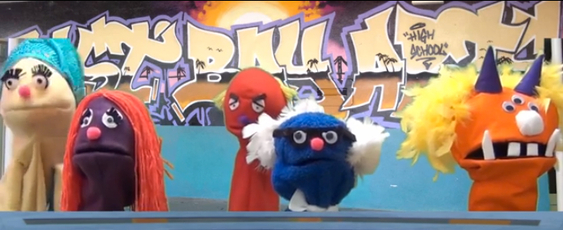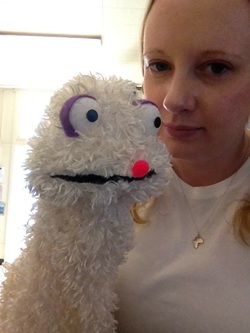Now, we all know he's the Puppet Man, who actually does have Twitter accounts for all his puppets, and even features them on his YouTube channel.
So when I was selected to take over the Leadership class at EBA, I quickly found an application for puppets on campus: hosting the weekly video news broadcast. Here is the playlist of all the Ninja News episodes so far. Yes, our mascot is the Ninja. Purple ninjas, actually.
Now, once other students saw the puppets, they wanted in on the sweet puppet-making action. So I ran a few workshops on Choice Day teaching students how to make puppets, and we even had all the 9th graders make sock puppets one afternoon.
Here's what I've learned about puppets since starting this endeavour:
- Students come alive when they get to do, make, build, and design
- Students love challenge when it's presented in a way that makes it seem fun (like: build a sock puppet! No directions! No help!)
- Grades and points cease to matter when something is truly engaging. I did have one student ask if his sock puppet would be graded, but other students told him to Just Stop before I had to. That feels pretty awesome.
- Kids become kids when they have a puppet on their hand. Suddenly, they are more playful, more funny, more animated, and more interesting. Yes, I mean interestING - I think you have to be interestED to be interestING. They also have started to think differently, and are much quicker to get to creative solutions to problems.
- Making puppets requires divergent thinking, storytelling, imagination, and creativity. Many kids find that overwhelming, because they are being asked to do things that aren't quantifiable. They get lost in the design phase because it cannot come from rote memorisation, or reliance on good academic habits. It becomes scary for them to have to try something that might fail. Those students need the most help and the least instruction. I spend a lot of time listening, and then helping them glean their ideas from all of the rubble. But if I give them an idea, it's no better than asking them to memorise the date Shakespeare was born. The real work still came from me in organising, planning, and valuing the information.
- Puppets are a great vehicle for teaching that it's okay to make mistakes. My first puppets aren't great (in order of how I made them: Albert, Kiwi, Gypsy, New Unnamed Puppet), but I'm proud of them, and I learned a lot more from making them than I did from just using the puppets Sam let me borrow (EduFelon and Tina). Figuring out how to do something like this required lots of YouTube videos, many hangouts with Sam, and a lot of trial and error. And it was really, really fun.

Tina (Sam)
Gypsy (Me)
EduFelon (Sam's student)
Albert (Me)
Kiwi (Me)

The kids absolutely love him.
The staff think I'm carrying a dog when I walk in with him.
Also, people can't agree on this puppet's gender. I'd like to know your thoughts!
So TL;DR:
Puppets are amazing. They are viable as an instructional strategy. They help students be more comfortable in their own skin, and with taking risks and thinking differently.
Go make one. Now.


 RSS Feed
RSS Feed
